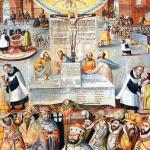The following are my opening remarks at the fifth annual Nevin Lectures, February 16-17, 2018.
Sixty years ago, British Pentecostal leader Donald Henry Frere Gee wrote that the Pentecostal Movement passed Jesus’ test: “By their fruit you shall know them.”
While Pentecostalism “makes no claim to perfection,” he wrote, its “great and solid achievements in missionary work; its fervent contribution to the cause of true Revival; and most of all its utter loyalty to the Lord Jesus Christ in His divinity and humanity, and the work of His atonement for our sins by His precious blood should still the tongues and pens of those who still publish evil of this great work of the Holy Spirit.”
Gee had reason to boast. Pentecostalism became a global movement almost instantly. Within two years of the outbreak of the Azusa Street revival in 1906, Pentecostalism had spread to fifty countries. And the fire hasn’t gone out in the century since. Pentecostal/charismatic Christianity is estimated to be the largest non-Roman Catholic expression of Christianity in today’s world. Historian Phillip Jenkins calls Pentecostalism the most successful social movement of the 20th century, still advancing after Marxism and Fascism have been reduced to rubble.
Gee wasn’t pointing to growth statistics or conversion rates alone. Jesus poses the question: Does Pentecostalism produce good trees? Gee thought so, and sociologist of religion David Martin agrees. In Latin America, the Spirit remakes people – men especially – in the same way that Methodism did over two centuries ago. Converted men break with the street, stop drinking, respect their wives and care for their kids. Pentecostal men are thrifty, disciplined, honest, hard-working, sober. Pentecostalism is a quiet cultural revolution in Latin America, Africa, and parts of Asia.
Still, the tongues and pens haven’t gone silent, because critics – many of them from the Reformed wing of the church that Theopolis occupies – don’t much like the taste of Pentecostalism’s fruit. Where Gee saw solid missionary work, some see manipulative charlatanry and unfulfillable guarantees of prosperity. Gee thought Pentecostals utterly loyal to Jesus; some regard charismatic Christianity as a mirror of the emotive subjectivism of late modernity. Gee thought Pentecostalism was the outworking of Christ’s atonement; critics see the pursuit of self-atonement by enthusiasm.
Our fifth Nevin lecturer, Professor Amos Yong, represents a matured and confident Pentecostalism. He has defended charismatic and Pentecostal Christianity biblically, theologically, and historically. But he is not here to be defensive. He believes, as he has written, that the “overarching goal [of the charismatic gifts] is . . . to announce, initiate, and inaugurate the reign of God in Christ, which is what heals, transforms, and saves the world.” Like other contemporary leaders in his tradition, he wishes to explore how Pentecostalism might contribute to the future of the global church.
A native of Malaysia, Prof. Yong is currently Professor of Theology & Mission at Fuller Theological Seminary in Pasadena, and director of the seminary’s Center for Missiological Research. He has wide interests, having written books on interreligious dialogue, disability, science and religion, politics, and the theology of love. Global Pentecostalism is among his many specialties, and it is the focus of his Nevin lectures this weekend.
I am honored to introduce Prof. Amos Yong.












